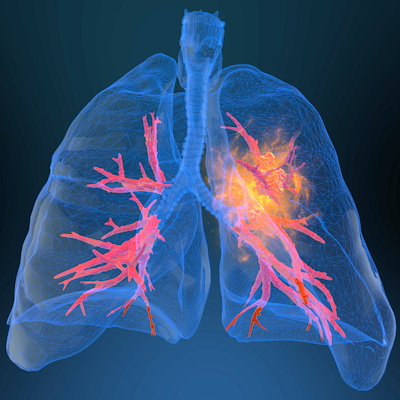June 5, 2023 -- A large, retrospective cohort study found that indefinite immunotherapy did not improve survival in patients with advanced lung cancer. The research, published Sunday in JAMA Oncology, was also presented at the 2023 American Society of Clinical Oncology annual meeting in Chicago.
Over the past decade, the use of immune checkpoint inhibitors has revolutionized treatment for patients with advanced lung cancer, improving overall survival rates and helping many patients live longer lives. However, the appropriate length of time for advanced non-small cell lung cancer patients to continue receiving immunotherapy treatment remains unknown, in part because clinical trials have used different treatment durations.
As lung cancer therapies have improved and become widely available, many patients have continued therapy beyond the one to two years tested in clinical trials. However, the longer patients continue treatment, the higher healthcare costs become, both to patients and to healthcare systems. In addition, there is an ongoing risk of immune-related side effects.
Researchers say it may take years to accumulate definitive data about therapy duration. In the absence of such data, the goal of this study was to use real-world observational data to provide guidance on this important clinical question. The researchers analyzed de-identified data from national electronic health records that included patients with advanced non-small cell lung cancer treated in both academic and community hospitals.
Of the 1,091 patients who received immune checkpoint inhibitors as part of their initial therapy, either alone or in combination with chemotherapy, and whose cancers had stopped growing, only one in five stopped immunotherapy at two years. These patients constituted the fixed-duration group. The majority who continued treatment beyond two years constituted the indefinite-duration group.
Data analysis revealed similar overall survival probabilities between the two groups: 79% for the fixed-duration group and 81% for the indefinite-duration group. The researchers concluded that stopping immunotherapy treatment at two years is a reasonable course of action for patients whose cancer hasn't progressed. Furthermore, they found no statistically significant difference in overall survival between patients who stopped treatment at two years and those who continued treatment indefinitely.
"We hope this data provides reassurance that stopping treatment at two years is a valid treatment strategy that does not seem to compromise overall survival," lead author Dr. Lova Sun, assistant hematology-oncology professor at the University of Pennsylvania, said in a statement.
"Ultimately, the field is still on the leading edge of determining the most appropriate duration for these immunotherapies that have been so effective for patients with advanced lung cancer," added senior author Dr. Charu Aggarwal, associate professor of hematology-oncology at the University of Pennsylvania. "This study provides important data that we hope will help patients feel less worried about potential risks of coming off therapy and more confident if they decide to discontinue treatment after two years."
Copyright © 2023 scienceboard.net













